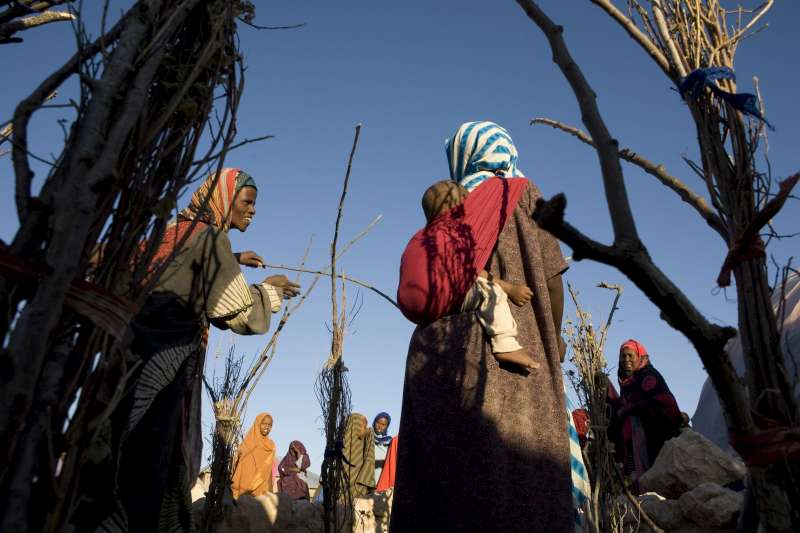Number of internally displaced people remains stable at 26 million
An annual report released by the Norwegian Refugee Council puts the number of internally displaced people in 2008 at 26 million last year, the same as 2007.

A group of internally displaced women, one bearing a sleeping child, in Galkayo, Somalia. © UNHCR/B.Bannon
NEW YORK, United States, May 4 (UNHCR) - The number of people living in other parts of their homeland after fleeing conflict, generalized violence and human rights violations stood at 26 million last year, unchanged from 2007, according to the Norwegian Refugee Council (NRC).
A report by NRC's Geneva-based Internal Displacement Monitoring Centre, released during a ceremony in New York last Friday, also said that the 26 million internally displaced people (IDP) included 4.6 million newly displaced in 2008, up 900,000 from the previous year, and an equivalent number of returns.
"In the context of conflict prevention, forced displacement remains a major challenge, as does the protection of internally displaced persons," UN High Commissioner for Refugees António Guterres said at the launch of the report, which was presided over by NRC Secretary-General Elisabeth Rasmusson.
The report said the biggest new displacement last year came in the Philippines, where 600,000 people fled fighting between the government and armed groups in the southern region of Mindanao. There were also large-scale displacements of 200,000 people or more in nine other countries: Sudan, Kenya, Democratic Republic of the Congo, Iraq, Pakistan, Somalia, Colombia, Sri Lanka and India.
South and South-east Asia were the regions with the largest relative change in the number of IDPs last year, with a 13 percent increase from the end of 2007. The report noted that Africa was the most affected continent, with 11.6 million IDPs in 19 countries, though this figure was down nine percent on 2007.
The countries with the largest number of internally displaced were the Sudan (4.9 million), Colombia (up to 4.3 million) and Iraq (2.8 million).
"We all share the responsibility to assist and show our solidarity with the world's IDPs," said Rasmusson. " Millions of IDPs are forced to survive in appalling conditions, in informal settlements alongside local communities, or hiding in urban slums or forests from the groups who displaced them."
The report said IDPs in 2008 were "exposed to a wide range of discrimination and human rights violations as a result of deliberate policies or neglect." It said that in 26 of 52 countries studied, the displaced continued to face attack and violence after moving. It highlighted the dangers faced by children, women, the elderly and ethnic minorities.
High Commissioner Guterres said that the "narrowing of humanitarian space" was one of several challenges the world faced in trying to help internally displaced populations. He also stressed that the impact of the global financial crisis must not allow neglected situations to worsen. The budgets of many humanitarian agencies were shrinking, he said, while the problems for the world's most vulnerable people are increasing.
Sir John Holmes, the UN's humanitarian affairs and emergency relief coordinator, said the scale of displacement was horrific. "Although the figures tell a story, they do not tell the whole story. There is an individual behind every number, and a family," he said at Friday's ceremony. He stressed the "need to work more upstream than downstream," intensifying efforts to prevent displacement.
By Natasha Yacoub
In New York, United States
